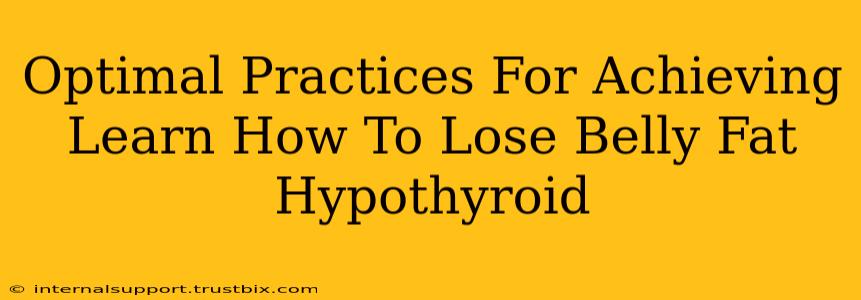Losing belly fat can be challenging for anyone, but it's especially difficult for individuals with hypothyroidism. Hypothyroidism, an underactive thyroid, slows down your metabolism, making weight loss harder. However, it's not impossible! By combining the right strategies, you can effectively learn how to lose belly fat even with a hypothyroid condition. This comprehensive guide outlines optimal practices to help you achieve your goals safely and sustainably.
Understanding the Hypothyroidism-Belly Fat Connection
Before diving into strategies, it's crucial to understand the connection between hypothyroidism and belly fat. Hypothyroidism disrupts your body's hormone balance, leading to a slower metabolism. This slower metabolism means your body burns fewer calories at rest, making it easier to gain weight, particularly around the midsection. Furthermore, hypothyroidism can sometimes lead to increased cortisol levels (stress hormone), which can also contribute to abdominal fat storage. Therefore, a holistic approach that addresses both the hormonal imbalances and lifestyle factors is essential.
Key Factors Contributing to Belly Fat with Hypothyroidism:
- Slow Metabolism: The primary culprit, reducing your body's ability to burn calories efficiently.
- Hormonal Imbalances: Fluctuations in thyroid hormones and increased cortisol contribute to fat accumulation.
- Water Retention: Hypothyroidism can cause water retention, leading to bloating and a larger waistline.
- Lifestyle Factors: Diet, exercise, and stress levels play a significant role alongside the hormonal issues.
Optimal Strategies for Losing Belly Fat with Hypothyroidism
Losing belly fat with hypothyroidism requires a multifaceted approach. It's not about quick fixes but about making sustainable lifestyle changes.
1. Optimize Thyroid Hormone Levels
This is paramount. Work closely with your doctor or endocrinologist. Ensure your thyroid medication dosage is correct and that your hormone levels are within the optimal range. Regular blood tests are crucial for monitoring your progress and adjusting medication as needed. Don't self-adjust medication; always follow your doctor's instructions.
2. Adopt a Balanced and Nutritious Diet
Focus on whole, unprocessed foods. A diet rich in fruits, vegetables, lean proteins, and healthy fats is essential.
- Prioritize Protein: Protein helps boost metabolism and satiety, preventing overeating. Good sources include fish, poultry, beans, and lentils.
- Choose Complex Carbohydrates: Opt for whole grains, such as brown rice and quinoa, over refined carbs like white bread and sugary drinks.
- Healthy Fats are Your Friends: Include sources like avocados, nuts, seeds, and olive oil.
- Limit Processed Foods, Sugar, and Refined Carbohydrates: These contribute to inflammation and weight gain.
3. Incorporate Regular Exercise
While cardio is important, strength training is particularly beneficial for those with hypothyroidism.
- Strength Training: Builds muscle mass, which boosts metabolism even at rest.
- Cardiovascular Exercise: Improves heart health and burns calories. Aim for at least 150 minutes of moderate-intensity cardio per week.
- Find Activities You Enjoy: Consistency is key. Choose activities that you find enjoyable and can stick with long-term.
4. Manage Stress Effectively
Chronic stress exacerbates hormonal imbalances. Incorporate stress-reducing techniques:
- Yoga: Improves flexibility and reduces stress hormones.
- Meditation: Promotes relaxation and mental clarity.
- Spending Time in Nature: Connects you with nature and promotes relaxation.
5. Prioritize Sleep
Adequate sleep is essential for hormone regulation and overall well-being. Aim for 7-9 hours of quality sleep per night.
6. Stay Hydrated
Drinking plenty of water helps with digestion, reduces bloating, and supports overall health.
Patience and Persistence are Key
Remember, losing belly fat with hypothyroidism takes time and patience. Don't get discouraged by slow progress. Celebrate small victories and stay consistent with your healthy habits. By implementing these optimal practices and working closely with your healthcare provider, you can successfully achieve your weight loss goals and improve your overall health and well-being. Your journey to a healthier you is within reach!

